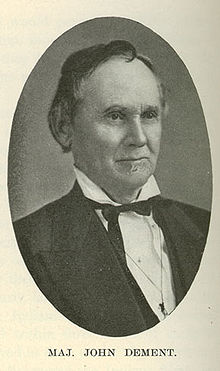John Dement
John Dement | |
|---|---|
Henry Dodge Dement | |
| Other work | Illinois State Representative U.S. Receiver of Public Moneys Illinois Constitutional Convention Delegate Electoral College elector |
John Dement (26 April 1804 – 16 January 1883) was an American politician and militia commander from the U.S. state of Illinois.
Born in
Early life
John Dement was born in Gallatin, Sumner County, Tennessee on April 26, 1804.[1] His parents, David and Dorcas Dement (née Willis) moved to Illinois in 1817 and he moved with them; the family settled on a farm in Franklin County.[1][2]
Political career
In 1826 Dement took his first political office when he was elected
By 1837,
In another capacity, Dement was elected delegate to every Illinois Constitutional Convention during his lifetime, except the first in 1818, when Dement was 14 years old.[1] At the conventions in 1862 and 1870 he was elected and served as president pro tempore.[2]
Militia service

Dement's political career was put on hold by the start of the 1832
As captain, Dement led a Fayette County
On June 16, 1832, Dement reenlisted in the
Dement's actions at the Second Battle of Kellogg's Grove later earned him praise from his adversary, Black Hawk. Black Hawk stated of Dement in his autobiography:
The chief and his few braves were unwilling to leave the field. I ordered my braves to rush upon them, and had the mortification of seeing two of my chiefs killed before the enemy retreated. This young chief deserves great praise for his courage and bravery, but fortunately for us, his army was not all composed of such brave men.[5]
During the battle, Dement's battalion lost five men with another three were wounded, many horses were killed as well.[5] That night American reinforcements arrived under the command of General Posey, who chose not to pursue the attackers and instead reported the situation to Taylor.[6] Black Hawk asserted later that had Posey chose to attack him and his warriors that the blow dealt Black Hawk's band would have been decisive and war-ending.[6] In fact, Dement's opinion was that there were more Native Americans at Kellogg's Grove than at any other engagement during the war.[6]
Dement's command served on active duty from its inception until the end of hostilities at the Battle of Bad Axe. The battalion was mustered out of service on August 7, 1832, which ended John Dement's military career.[4]
Dement Town
In 1849, while holding the United States General Land Office receiver post, Dement settled in Dixon, Illinois. Dement erected a residence and stone store and later Judge John D. Crabtree settled in the area. Near the center of the area settled by Dement was a well known area called Sandhill Grove. Sandhill Grove contained sandy soil, a large oak stand, and during certain seasons large flocks of cranes.[7]
Dement helped to persuade the
Late life and death
John Dement married Mary Lousie Dodge, daughter of Black Hawk War commander
Notes
- ^ a b c d e f g h i Armstrong, Perry A. The Sauks and the Black Hawk War, pp. 630–634.
- ^ a b c d e f g Lusk, David W. Politics and Politicians: A Succinct History of the Politics of Illinois (Google Books), H. W. Rokker: 1884, pp. 326–328. Retrieved 18 September 2007.
- ^ Lanman, Charles. Biographical Annals of the Civil Government of the United States: During Its First Century, (Google Books), J. Anglim: 1876, p. 528–529. Retrieved 18 September 2007.
- ^ a b c Armstrong, Perry A. The Sauks and the Black Hawk War, pp. 430–435.
- ^ a b Dement, John and Wisconsin Historical Society. "Report of the Battle at Kellogg's Grove," Historic Diaries: Black Hawk War, June 25: The Battle of Kellogg's Grove. Originally published in: Whitney, Ellen M., ed. The Black Hawk War, 1831-1832, Springfield: Illinois State Historical Society, 1970, p.680. Retrieved 26 July 2007.
- ^ a b c Autobiography of Ma-Ka-Tai-Me-She-Kia-Kiak, "Major Dement's Battle with the Indians Archived 2007-08-30 at the Wayback Machine." Retrieved 18 September 2007.
- ^ a b c "Dement Town," Lee County Historical Society, Stories & Articles, 31 May 2004. Retrieved 18 September 2007.
- ^ Reynolds, John. The Pioneer History of Illinois, (Google Books), Fergus Printing Company: 1887, p. 139. Retrieved 18 September 2007.
References
- Armstrong, Perry A. The Sauks and the Black Hawk War, (Google Books), H.W. Rokker: 1887. Retrieved 18 September 2007.
- LeClaire, Antoine, interpreter; Patterson, J. B., ed., Autobiography of Ma-Ka-Tai-Me-She-Kia-Kiak, or Black Hawk, Embracing the Traditions of his Nation, Various Wars In Which He Has Been Engaged, and His Account of the Cause and General History of the Black Hawk War of 1832, His Surrender, and Travels Through the United States. Also Life, Death and Burial of the Old Chief, Together with a History of the Black Hawk War, Oquawka, IL: J. B. Patterson, 1882, "Kellogg's Grove Fort." Retrieved 18 September 2007.

